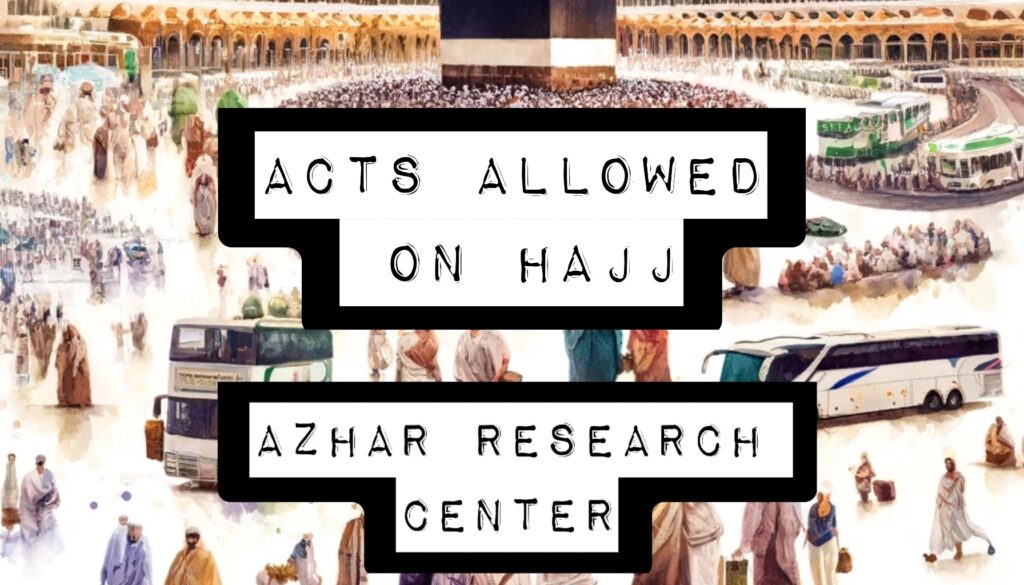Acts Allowed On Hajj: Azhar Research Center

With the names of Allah: the Most Gracious, the Most Merciful
This is a brief document translated and organized by the Suhaib Webb Institute for pilgrims, educators and guides. The original was prepared by the Azhar Center for Research under the leadership of Dr. Ahmed Tayyib, the current Sheikh al-Azhar.
Appreciate this work? Support my institute by subscribing at Join.suhaibwebb.com today!
Suhaib Webb
Introduction
Praise be to Allah and blessings and peace be upon our Master, the Messenger of Allah, and upon his family and companions
To alleviate the great hardship that befalls some pilgrims of the Sacred House of Allah due to travel, crowding, hot weather, and other difficulties, the Al-Azhar Global Fatwa Center at the Al-Azhar Mosque presents a short document titled: The Clarification On Permissible Actions for Pilgrims and Those Performing Umrah.
It clarifies what is permissible for pilgrims to do, contrary to what many people think is prohibited during Hajj. These actions are, in fact, permissible, and there is no harm in doing them.
Know, dear pilgrim, the following are permissible while on Hajj::
1. Wear your ihram clothes and declare your intention for Hajj before leaving your home, at the airport (if possible), or on the plane as long as you have not crossed the miqat.
2. For a menstruating woman or a woman experiencing postnatal bleeding, it is permissible to intend ihram, as purification is not a condition for ihram.
3. Change your intention among the three types of pilgrimage (ifrad, tamattu’, and qiran) before crossing the miqat. After crossing the miqat, it is permissible to switch from ifrad to tamattu’ and from qiran to tamattu’. There is a detailed discussion and disagreement among scholars regarding the reverse.
4. Wear a belt with your ihram clothes, carry a bag in your hand, wear a wristwatch, sunglasses, or a ring. All of this is permissible.
5. Wear medical shoes and a medical belt with your ihram clothes if needed.
6. If you have an excuse, such as urinary incontinence or bleeding, you can protect your clothes and perform tawaf and sa’i. By wearing diapers or shields.
7. Carry an umbrella over your head as long as it is not attached to your head.
8. For a woman in ihram, it is permissible to wash and comb her hair while taking care to avoid intentionally causing hair to fall.
9. Take a bath while in ihram, avoiding the use of perfume.
10. Enter the Sacred Mosque (Masjid al-Haram) through any gate you wish.
11. Know that you have a supplication that is answered upon seeing the Kaaba for the first time, so rejoice in this.
12. Rest during your tawaf and sa’i if needed, such as due to old age or severe fatigue.
13. Point to the Black Stone with your hand if you cannot reach it.
14. Perform tawaf on the upper floors, and you will receive the same reward as those who perform tawaf around the Kaaba directly.
15. It is recommended to pray two rak’ahs behind the Maqam Ibrahim or in any place that is convenient for you in the mosque if it is crowded.
16. You are permitted to skip the arrival tawaf (tawaf al-qudum) and go directly to Arafat if you arrive late.
17. It is permissible to go to Arafat before noon.
18. You may skip going to Mina on the eighth day and go directly to Arafat.
19. Know that the entire area of Arafat is a place of standing except for the bottom of the valley (Wadi ‘Uranah).
20. It is permissible to sleep, eat, drink, seek shade, walk, sit, and do what others do during the rites of Hajj.
21. You may also seek medical treatment if you suffer any harm, Allah forbid, during the rituals.
22. Know that in cases of necessity, you are allowed to leave Arafat before sunset without any penalty. This is the opinion of the Shafi’i scholars, and is supported by the hadith narrated by the authors of the Sunan from Ghazwah ibn Mudarris al-Tai, who said: “I came to the Messenger of Allah at the place of gathering (meaning Muzdalifah) and said: ‘O Messenger of Allah, I came from the mountain of Tayy, I exhausted my camel and tired myself. By Allah, I left no mountain but I stood upon it. Is there Hajj for me?’ The Messenger of Allah said: ‘Whoever prays this prayer with us and stands with us until we depart, and has already stood at Arafat before that, day or night, has completed his Hajj and fulfilled his ritual.'”
23. It is permissible to combine Maghrib and Isha prayers before reaching Muzdalifah, combining them at the earlier time.
24. You are also allowed to leave Muzdalifah at night to throw the pebbles.
25. Spending the night at Muzdalifah is achieved by the mere stopping of the car, bus, or yourself for a short time, even if only for 5 minutes.
26. You can collect the pebbles from any place; it is not required to collect them from Muzdalifah.
27. You may throw the pebbles before noon.
28. You may advance or delay the actions of the Day of Sacrifice as you wish. The Messenger of Allah said to those who asked about advancing or delaying some of the actions of Hajj: “Do it, there is no harm.”
29. You may appoint someone to throw the pebbles on your behalf if you have an excuse.
30. There is no specific size required for the pebbles used for throwing.
31. It is recommended to spend the nights of Tashreeq in Mina; the Messenger of Allah permitted his uncle Al-Abbas to skip this stay due to an excuse and did not require him to offer a sacrifice, which is the ruling for fatwa.
32. You can combine the farewell tawaf with the tawaf of Hajj.
33. Purification is not a condition for sa’i between Safa and Marwa.
34. Menstruating women and women experiencing postnatal bleeding may take a bath, protect themselves, perform tawaf, and sa’i if necessary, such as fearing missing the group.
35. Engaging in intercourse after the initial release (tahallul al-asghar) does not invalidate the Hajj, but a sacrifice is required.
36. It is permissible for a pilgrim to perform tawaf and sa’i while riding if needed.
37. You are also allowed to appoint someone to slaughter on your behalf.
38. It is recommended that your last act in the Sacred House be the farewell tawaf.
39. Pilgrims are also permitted to shop and buy whatever they need.
40. You are allowed to hasten your departure on the second day of Tashreeq if you leave before sunset, as Allah says: “Whoever hastens to leave in two days, there is no sin upon him, and whoever delays, there is no sin upon him…” (Al-Baqarah: 203).









